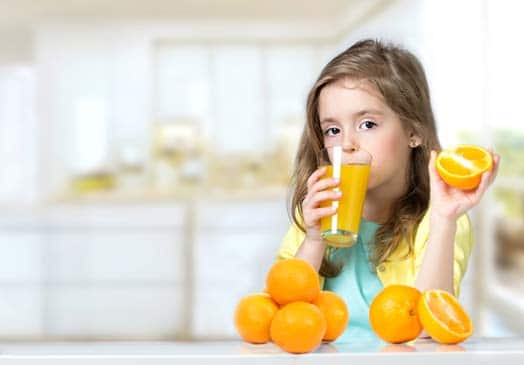Fruit juice is marketed as a healthy drink. Parents let babies spend their days with sippy cups full of apple juice. Juice boxes are big sellers. And adults think they are doing themselves a favor by drinking it instead of soda.
That’s why the new diet guidelines from the prestigious American Academy of Pediatrics came as a surprise to many. It recommends kids stay away from fruit juice. And researchers warn it’s bad for adults, too.
The AAP report states that fruit juice “has no essential role in healthy balanced diets of children.”1
The pediatricians are not talking about juice drinks packed with added sugar. They are talking about 100% fruit juice.
The high natural sugar content sets kids up for weight gain and a possible lifetime of obesity, pediatricians say.2
The no-juice rule is “long overdue,” said Dr. Elsie M. Taveras. She is chief of general pediatrics at Massachusetts General Hospital for Children. “Parents feel their infants need fruit juices, but that’s a misconception.”
Juice: Bad for Babies, Bad for You
Why has juice been considered healthy for so long?
Nutritionists say it’s because of absurd U.S. government diet guidelines. For years, they equated one cup of fruit juice to one cup of fruit. But there are big differences.
Fruit contains fiber. This slows the absorption of sugar into the bloodstream. Whole fruit also contains far more nutrients, which are often stripped out in the juicing process.
Fruit Juice has as Much Sugar as Soda
Dr. Yoni Freedhoff is an assistant professor of family medicine at the University of Ottawa. He is a leading fruit juice researcher.
“Per drop, juice has the same amount or more of both sugar and calories when compared with sugared soda,” Dr. Freedhoff notes.
“If you agree that adding vitamins and minerals to Coca-Cola wouldn’t make it a healthy choice, then you probably should reconsider that morning glass of orange juice. That’s all it really is—flat soda pop with vitamins, from which the processing has removed the vast majority of the fruit’s actual nutrition.”3
A 2014 study in the journal Obesity found that children who regularly drink fruit juice have a far greater chance of being obese later in life. Drinking eight or more ounces of juice a day makes them 36% more likely to become obese.4
When you look at the sugar content of fruit juices, it’s no wonder they lead to obesity in kids…and adults.
Researchers in Britain examined the sugar content of 203 juices. They found that nearly half were packed with sugar. Just one 7-ounce juice serving was found to contain at least 5 teaspoons of sugar. This is about the same amount of sugar as in soda, which clocks in at 10 teaspoons in a 12-ounce serving.
Best Drink for Good Health
What’s the solution? The AAP recommends that infants stick with mother’s milk, formula, or water.
When it comes to fruit, both kids and adults are better off with whole, fresh, organic fruit instead of juice. That way you get all the healthy fiber and nutrients without the high concentration of sugar.5
And when you’re thirsty, you can’t do better than drinking plain, filtered tap water. As one group of researchers put it, “Your body would be perfectly content if you drank nothing but water.”6
Editor’s Note: If these three “chemicals” are working against you, your sugar cravings may never stop. But you can get them under control without giving up the foods you love. Discover all the details HERE.
Like this Article? Forward this article here or Share on Facebook.
References:
1 http://www.deseretnews.com/article/865680561/Your-baby-shouldnt-drink-juice-Should-anyone-in-your-family.html
2 http://pediatrics.aappublications.org/content/early/2017/05/18/peds.2017-0967
3 http://www.deseretnews.com/article/865680561/Your-baby-shouldnt-drink-juice-Should-anyone-in-your-family.html
4 http://onlinelibrary.wiley.com/doi/10.1002/oby.20927/full
5 http://pediatrics.aappublications.org/content/early/2017/05/18/peds.2017-0967
6 http://www.deseretnews.com/article/865680561/Your-baby-shouldnt-drink-juice-Should-anyone-in-your-family.html

